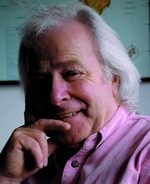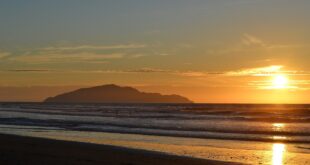 Because I am going to be a regular face on the GrownUps website, I have been asked to tell you a bit about myself, for those who don't know who I am. Got to say, I'm reluctant to do it, but I do want to talk about something quite personal and it involves a topic that few people like to talk about.
Because I am going to be a regular face on the GrownUps website, I have been asked to tell you a bit about myself, for those who don't know who I am. Got to say, I'm reluctant to do it, but I do want to talk about something quite personal and it involves a topic that few people like to talk about.
I lost my way in life in the 1970s and I walked out on a wife and family including a young daughter who was later diagnosed as having a very serious heart disorder.
There was no excuse for what I did — only selfishness.
Meagan Jane Dick had a pacemaker fitted when she was barely six months old and she spent the rest of her life in and out of hospital having treatment, having new pacemakers fitted and living a life on the brink. Despite frail health Meagan was determined to get the most from her life and she travelled through it at 200 miles an hour.
Against all odds, and against medical advice, she had a baby — Dillon who is now 14 years old.
Despite everything she still loved me.
She was stoic and brave in the face of extreme adversity and always cheerful despite her increasing spells in hospital.
When she was well enough she worked in rest-homes because she loved the elderly.
Meagan and Dillon came to stay with Keri and I in Auckland in mid-2000 and Keri got her into the heart transplant system at Greenlane Hospital.
After many, many tests the doctors decided that Meagan needed a heart and lungs transplant, but that she was too frail and there was really nothing to be done.
Meagan was visibly affected by that, because she had always had hope.
Dillon was sent home to his Dad in Invercargill while Meagan stayed on for a few days to have a few more super-hot Indian meals that she so enjoyed with Keri and I before also returning to Invercargill in the mid-winter.
Keri and I were planning a surprise visit to Italy to attend the wedding of Keri's closest friend, Maria. Maria was marrying Peter in Italy and returning home to settle in Auckland.
We told Peter we were coming, but not Maria.
We were on an early morning flight out of Auckland and I crept into Meagan's bedroom, kissed her on the forehead and said we were off — "Goodbye Dad, you and Keri have a great time."
Meagan was flying home the next day.
The arrival in Italy and the look of surprise on Maria's face was worth a million dollars when she saw Keri across the crowded square in Sienna.
We were all staying in a huge 600 year old Italian villa and that night the women stayed in while the boys went out in search of the perfect grappa.
I was in bed at midnight and my cellphone went. I let it ring and in the morning, with the sun streaming in the open shutters, swallows darting about and a hillside of grape vines in my view I checked the phone and got a message from back in Auckland . . .
Gavin Shaw who was a close friend was saying, "Hi Allan, bad news, Meagan's in Invercargill hospital — and it doesn't look good."
I rang Kew Hospital from that lovely room high in the Italian villa and was told — "I'm sorry Mr Dick, you've missed Meagan by three hours."
I hope nobody has to go through learning that one of your children has died. Meagan was just 29.
Keri and I decided to say nothing, but got on the phone straight away, moved our return travel arrangements forward 24 hours and attended the wedding. We were flying with Qantas and they were magnificent. Instead of flying home to Auckland, we flew into Christchurch where Holden had a car fuelled and ready for the long, sad drive down to Invercargill.
The wedding was at noon followed by the traditional breakfast and then we announced we were leaving. Maria was stunned, — "but why, surely stay the night."
We told them Meagan had died.
We caught a bus from Sienna to Florence and were to catch the train to Frankfurt in Germany for the flight home.
But at the Florence railway station we found that the Italian railway system was on 48 hour strike.
I stood outside the railway station on that hot Saturday afternoon, around me hundreds of Italians rode noisy, smoky, smelly two-stroke motor scooters. The noise was horrendous and I didn't know what to do.
Keri, a calm voice in the melee — said "There must be an airport." There was. We caught a rattly old bus and there were just two flights left that night — one to Rome and the other to Munich.
We caught the plane to Munich and stayed overnight in the wonderful Kempinski Hotel attached to the all-glass airport.
Next morning the Kempinski staff, knowing the situation, took charge and booked us trains to Frankfurt where we caught the Qantas flight. At Sydney, Meagan's elder sister Sharon and her brother Anthony boarded the same plane, so we could all drive to Invercargill together. This was purely coincidental.
It was an awful, awful time.
Back in Auckland we checked our phone messages, there was a message from Meagan the day she had arrived back in Invercargill — "Hi Dad and Keri, hope you had a wonderful time in Europe — thanks for looking after Dillon and me. Love you."
Eighteen months later, Maria and Peter were well settled in Bush House near Wellsford north of Auckland and Maria's health was not good. She had an incurable kidney disease for a long time and it worsened. She was on dialysis and her life had become an absolute misery.
It got worse and worse and it was obvious she was going to die. Unless she had a kidney transplant.
Her family all tried. Nobody was compatible.
Keri offered, but she too was the wrong blood type.
I had a feeling that my blood type would match. I swear I heard Meagan telling me "go on Dad, I needed a transplant, you can help."
Without telling Maria or Peter I had a test and I was compatible.
We arranged to take Maria and Peter out for dinner and tell them, but Peter had to go to Bush House and watch that a scrub fire didn't spread. So Keri and I gook Maria out and we broke her the news. That was a moment I will never forget.
"We've got a kidney for you Maria," I said.
Maria just looked and didn't understand. She had given up hope.
I just looked at her.
Maria looked at Keri — "What does he mean? Does he mean . . . ."
"Yes Maria, Allan's compatible," said Keri.
Maria cried, and cried some more. She hugged me. She hugged Keri. She cried some more. She told the waiter. She hugged the waiter. The waiter shook my hand. Maria cried some more then got on the phone to Peter to tell him.
Then began probably a year of tests, more tests, counselling to make sure I knew what I was doing and more tests. Maria's health was of concern. She was too weak. Then she was strong enough, but there were other complications.
All the time Maria was on hated dialysis.
Then she decided she didn't want the kidney — she would just die.
We persuaded her and finally it all came together. Her health was as good as it could be and we were in hospital.
On the night before the operation I visited Maria having what would be her final dialysis. Peter had had to go back to Europe on family business and wasn't there.
Maria was frail, her eyes blank, she hated the big needles in her arm and having to sit while the machine cleaned her blood.
Next morning I was in the theatre, a quick jab in the arm and the next thing I woke up back in my little room, sun streaming in, Keri there and Maria's doctor poking his head around the door saying — "The kidney's in, it started working straight away, Maria's fine."
I too felt fine. Some pain, but not too bad. I was up that night walking slowly around the corridors, attached to a drip. I went home two days later, drank beer the next night, mowed the lawns two days later and have never looked back.
I healed very, very quickly and have had absolutely no side effects. The scars have long, long gone.
Maria's recovery was instant. She got life back in her eyes. She was animated. No more dialysis. The kidney was working fine.
Peter arrived back from Europe and they began making plans for overseas holidays, buying a campervan and travelling New Zealand.
But then Maria starting having an adverse reaction to the anti-rejection drugs, fell into a coma and died.
We were in Australia near Cairns when we learned of Maria's death. We didn't come home, but with friends Brian and Jill Houston, we held our own service on a beach the day of her funeral.
When it was learned I was giving Maria a kidney I had more people ask if I really knew what I was doing than offered me encouragement. That surprised me because all the research I had done — an it wasn't really a lot — assured me I would be fine with one kidney and I didn't really think it was any big deal. I still don't. Maria was Keri's friend more than mine and I think, had she lived, I would probably have made a decision to keep myself distant just a bit rather than think of the kidney as a blood bond.
I have no regrets at all, other than wishing Maria had lived. People tell me it was "generous". I can't see that. It really was no big deal — three or four days in hospital, a bit of initial discomfort, but that was it really.
Why did I do it? Because I could. Because I thought if I can help someone I should. But really I did it because I had the opportunity to try and give life — a chance that Meagan never had. I did it for Meagan.
Please click here to read my regular blog on GrownUps. Thank you.









- 12 years ago
Hi Allan and Keri,
Have thought of you often and will always think of you both, like you Allan life has not been kind to me either quite a struggle in fact.
Sounds like you’re doing okay now. Do hope I’m correct in assuming this.
Tomorrow Blair is taking a bus load of folk to race track at Cromwell, driving bus around track then Museum , then lunch and drinks.
I hear you are no longer involved there do hope this is not for health reasons.
You have sure had your share, how is young Dillon doing? Big hugs to yourself and Keri. sue and Blair Duncan.
PS. Sure miss your rustic touch in NZ Today.